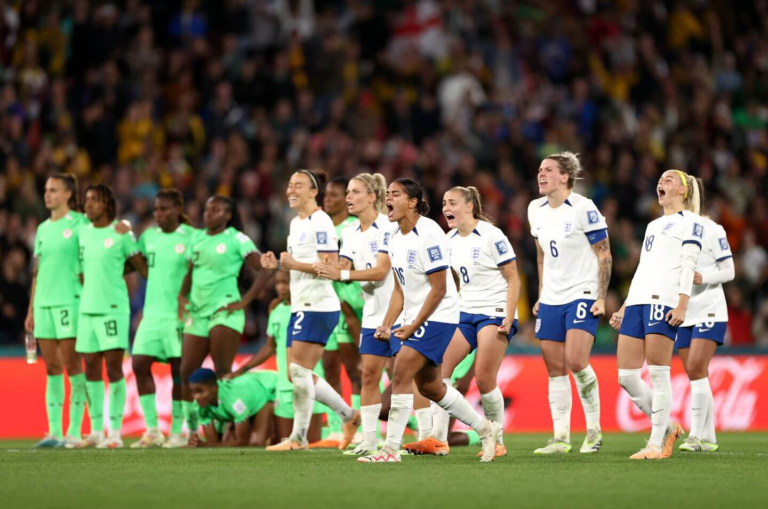Introduction
The England women’s national football team, known as the Lionesses, and the Nigeria women’s national football team, also called the Super Falcons, have had a few notable encounters on the international stage. Their matches are a reflection of the evolution of women’s football globally, showcasing both teams’ talents and growth in the sport. This article explores the timeline of their meetings, highlighting significant moments and achievements in each match.
Early Encounters and Development (1995–2000s)
The first official meeting between the two teams took place during the 1995 FIFA Women’s World Cup in Sweden. Both England and Nigeria were relatively new to the global women’s football scene at the time, as women’s football was still developing internationally. While Nigeria had more experience in continental competitions, being the dominant force in African football, England had a growing domestic league that fed into their national team.
June 1995 – FIFA Women’s World Cup, Group Stage
- Venue: Olympia, Helsingborg, Sweden
- Result: England 3–2 Nigeria
In their first clash at the 1995 World Cup, England secured a narrow victory against Nigeria. Despite Nigeria’s athleticism and raw talent, England’s tactical discipline and experience played a significant role. This match marked the beginning of their competitive rivalry. Goals from Karen Walker and a brace by Hope Powell, who would later become a prominent figure in English football, helped secure England’s win. Nigeria, however, proved to be a resilient team with goals from Nkiru Okosieme and Florence Omagbemi.
1999–2000s: Both Teams Build on Experience
After their initial World Cup encounter, the two teams did not meet for several years. However, during this period, both nations invested heavily in women’s football. England made strides under the leadership of Hope Powell as head coach (appointed in 1998), and Nigeria continued to dominate the African Women’s Championship (now known as the Africa Women’s Cup of Nations).
The absence of regular fixtures between the two sides during the early 2000s can be attributed to differing continental competitions and their World Cup progress. However, both nations focused on building their domestic structures, with Nigeria sending many players abroad, while England grew its domestic league (the FA Women’s Super League).
2019 FIFA Women’s World Cup Build-Up and Growth
During the 2010s, both England and Nigeria’s women’s teams were making significant advancements on the global stage. The Lionesses emerged as a powerhouse in Europe, regularly competing in the UEFA Women’s European Championship and reaching the later stages of the Women’s World Cup. Nigeria, meanwhile, continued to assert its dominance in Africa, regularly qualifying for the World Cup.
While the two teams didn’t meet on the field during this period, their growing status in women’s football set the stage for future encounters. The rise of stars like England’s Lucy Bronze, Ellen White, and Nigeria’s Asisat Oshoala helped elevate both teams to international prominence.
2023 FIFA Women’s World Cup – Knockout Stage Clash
August 2023 – FIFA Women’s World Cup, Round of 16
- Venue: Brisbane, Australia
- Result: England 0–0 Nigeria (England won 4–2 on penalties)
One of the most dramatic encounters between these two teams took place during the 2023 FIFA Women’s World Cup in Australia. The Lionesses, led by head coach Sarina Wiegman, came into the tournament as one of the favorites, having won the 2022 UEFA Women’s Euro. Nigeria, on the other hand, boasted their strongest squad in years, featuring players like Barcelona’s Asisat Oshoala.
The match was a tense affair, with both teams having opportunities to score, but it ended 0-0 after 120 minutes. Despite a dominant performance from Nigeria, including hitting the woodwork multiple times and a strong defensive showing, England managed to hold on, even after their star player, Lauren James, was sent off for a red card offense. In the ensuing penalty shootout, England emerged victorious, winning 4-2 and progressing to the quarterfinals. Nigeria’s exit was heartbreaking given their courageous display, but it showed their potential as a force in women’s football.
This match was notable for:
- Nigeria’s excellent defensive performance, limiting England’s attacking threats.
- Lauren James’ controversial red card for a stamp on Nigerian player Michelle Alozie.
- England’s resilience to win the penalty shootout despite being a player down.
Legacy and Impact
The matches between England and Nigeria have highlighted the evolution of women’s football across different continents. England’s continued growth as one of Europe’s leading teams, combined with Nigeria’s status as the most successful African women’s team, ensures that future encounters will continue to capture the attention of football fans globally.
Key Takeaways:
- 1995: England’s narrow 3-2 win over Nigeria in the group stage of the World Cup marked the start of their rivalry.
- 2023: A dramatic round-of-16 clash at the 2023 World Cup, which saw England edge out Nigeria on penalties after a goalless draw, cemented their competitive history.
Both teams are pivotal in the growth of women’s football in their respective regions, and their matches serve as a testament to the global nature of the sport. As women’s football continues to expand, the rivalry between England and Nigeria is sure to develop further in future tournaments.
Conclusion
The timeline of the England vs Nigeria women’s national football teams is a fascinating journey of two different football cultures coming together on the world stage. Their early encounters laid the foundation for future competitive matches, with both teams growing in strength and stature. With each meeting, the rivalry has intensified, making it one of the most interesting matchups in international women’s football. As both nations continue to invest in women’s football, future encounters promise to be just as exciting and unpredictable.
Also Read This: West vs East Match Player Stats
